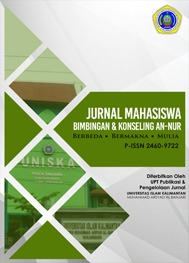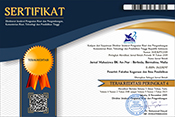PENGARUH POLA ASUH ORANG TUA TERHADAP DISIPLIN BELAJAR SISWA
(1) Universitas Kristen Satya Wacana
(2) Universitas Kristen Satya Wacana
(3) Universitas Kristen Satya Wacana
(*) Corresponding Author
Sari
Kata Kunci
Teks Lengkap:
PDFReferensi
Ambarwati, T., & Fitriasari, F. (2021). Efikasi Diri Terhadap Kinerja Usaha Dengan Komitmen Berwirausaha Sebagai Variabel Mediasi Pada Umkm. Jurnal Ilmu Manajemen, 9(4), 1430–1439. https://doi.org/https://doi.org/10.26740/jim.v9n4.p1430-1439
Azwar, S. (2013). Metode Penelitian (14th ed.). Yogyakarta: Pustaka Pelajar.
Ghozali, I. (2018). Aplikasi Analisis Multivariate dengan Program IBM SPSS 25. Semarang: Badan Penerbit Universitas Diponegoro.
Hidayat, Z. (2015). Hubungan Self-Efficacy dengan Peak Performance pada Atlet Sepakbola Sekolah Sepakbola (SSB) Yapora Pratama U-15 dan U-17 Pekanbaru (Universitas Islam Negeri Sultan Syarif Kasim Riau). Universitas Islam Negeri Sultan Syarif Kasim Riau. Retrieved from https://repository.uin-suska.ac.id/6543/
Jatisunda, M. G. (2017). Hubungan Self-Efficacy Siswa SMP dengan Kemampuan Pemecahan Masalah Matematis. Jurnal THEOREMS (The Original Research of Mathematics), 1(2), 24–30. https://doi.org/http://dx.doi.org/10.31949/th.v1i2.375
Juita, A., Syahriadi, S., & Aspa, A. P. (2022). Hubungan Self-Confident Terhadap Peak Performance Atlet Sepakbola Kuansing Soccer School. Jurnal Ilmiah STOK Bina Guna Medan, 10(2), 63–72. https://doi.org/https://doi.org/10.55081/jsbg.v10i2.683
Maghdalena, P. (2017). Meningkatkan Hasil Belajar Bola Voli Melalui Modifikasi Permainan Spoonbot Pada Peserta Didik Kelas V Di Sd Negeri Tegalsari 03 Kecamatan Candisari Kota Semarang. Malih Peddas (Majalah Ilmiah Pendidikan Dasar), 7(1), 94–104. https://doi.org/https://doi.org/10.26877/malihpeddas.v7i1.1783
Manah, A. C., & Jannah, M. (2020). Hubungan antara regulasi emosi terhadap kepercayaan diri pada atlet Taekwondo di Mojokerto. Character: Jurnal Penelitian Psikologi, 7(4), 155–160. Retrieved from https://ejournal.unesa.ac.id/index.php/character/article/view/37110
Prambayu, A. N. (2017). Hubungan Antara Self Efficacy dan Peak Performance pada Atlet Bulu Tangkis di Purwokerto (Universitas Muhammadiyah Purwokerto). Universitas Muhammadiyah Purwokerto. Retrieved from https://repository.ump.ac.id/6977/
Putri, F. A. R., & Fakhruddiana, F. (2018). Self-efficacy guru kelas dalam membimbing siswa slow learner. JPK (Jurnal Pendidikan Khusus), 14(1), 1–8. https://doi.org/10.21831/jpk.v14i1.25161
Sirajuddin, I. S. (2020). Pengaruh self-efficacy terhadap peak performance pada atlet futsal SMA di Cileungsi (Universitas Negeri Jakarta). Universitas Negeri Jakarta. Retrieved from http://repository.unj.ac.id/10217/
Subari, F. (2019). Meningkatkan peak performance dengan imagery trainning terhadap atlet bola voli UIN Maulana Malik Ibrahim Malang (Universitas Islam Negeri Maulana Malik Ibrahim Malang). Universitas Islam Negeri Maulana Malik Ibrahim Malang. Retrieved from http://etheses.uin-malang.ac.id/15691/
Suharsono, Y., & Istiqomah, I. (2014). Validitas Dan Reliabilitas Skala Self-Efficacy. Jurnal Ilmiah Psikologi Terapan, 2(1), 144–151. https://doi.org/https://doi.org/10.22219/jipt.v2i1.1776
Sukma, C. D., & Hasya, N. A. (2023). Tingkat Efikasi Diri Dalam Menyusun Skripsi Pada Mahasiswa Bimbingan Dan Konseling Universitas Muhammadiyah Prof. Dr. Hamka Angkatan 2018. Jurnal Mahasiswa BK An-Nur : Berbeda, Bermakna, Mulia, 9(1). https://doi.org/http://dx.doi.org/10.31602/jmbkan.v9i1.10220
Utama, A. (2020). Psikologi Olahraga. Bogor: Guepedia. Retrieved from https://books.google.co.id/books?hl=id&lr=&id=7qJKEAAAQBAJ&oi=fnd&pg=PA3&dq=wang+2010+pemain+peak+performance+dapat+tampil+baik&ots=cu8uqhSX-h&sig=6M3Fx_zjJ9wnfEroGumubqkXpl8&redir_esc=y#v=onepage&q&f=false
DOI: http://dx.doi.org/10.31602/jmbkan.v9i1.9524
Refbacks
Akun Akademik Anda Terhubung dengan :
Didedikasikan Untuk:
Jurnal Mahasiswa BK An-Nur : Berbeda, Bermakna, Mulia disseminated below Lisensi Creative Commons Atribusi 4.0 Internasional.
















